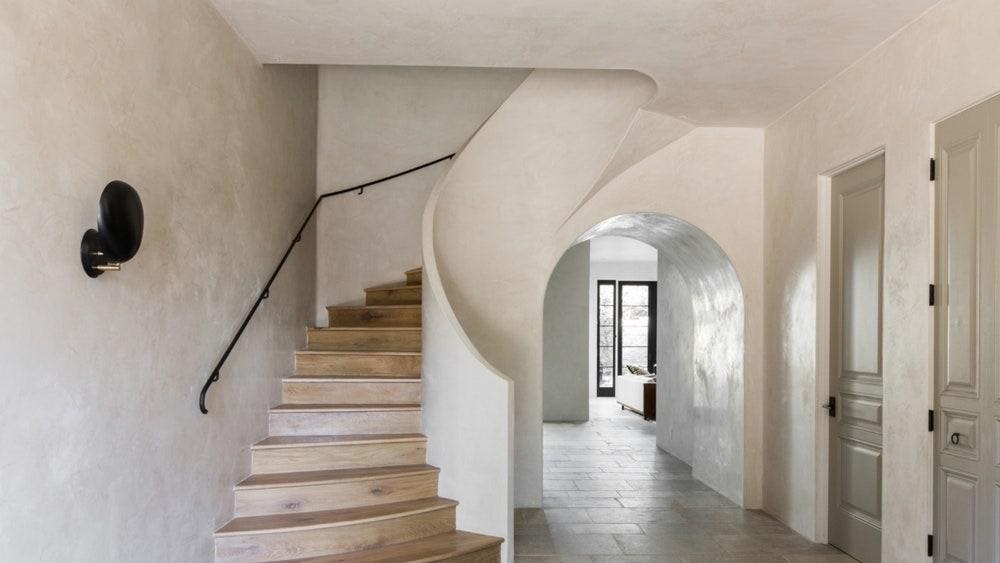When it comes to interior design, the use of venetian plaster should not be subjected to any limitations or preconceived notions.
Today, it is extensively used for interior decoration in both domestic and commercial properties.
Since the increased awareness of global warming and climate change, venetian plaster has been preferred by environmentalists for its exceptional ecological properties.
The polished plaster’s process is kind to the environment, making use of minimal chemicals and energy. venetian plaster application is revered for its aesthetic beauty, durability, and resistance.
Venetian Plaster Look
Originating in Italy, venetian plaster earned widespread popularity and repute in Roman Empire as a means to simulate natural stone surfaces in the cathedrals, villas and palazzos.
Artisans would mix lime plaster with pigments and marble dust to make compound venetian plaster, then turn over on the ceilings or walls in multiple thin levels with overlapping, short strokes.
Today, professional painters still utilize this authentic method. Whatever method you select for the ceilings and interior walls in bathrooms, bedrooms or living rooms, venetian plaster application will make your property or structure look luxurious and splendid.
Methods for Applying the Plaster
Technique: Smart do-it-yourselfers can apply synthetic and homemade venetian plaster according to their requirement and budget but they must understand that application needs superior painting abilities.
At the same time, homeowners should have experience using a hawk and trowel before taking on any do-it-yourself installation. A classic lime venetian plaster should always be installed professionally.
This is because lime venetian plaster has runny consistency, a fast-drying time, which makes it tough to mend flaws once applied. Moreover, this venetian plaster application has high materials price for remaking a flawed application.
Timeline: When choosing a synthetic venetian plaster or homemade venetian plaster, homeowners have to spend a couple of days on the process, while a professional would take a few more days to apply original lime venetian plaster, which can require up to 10 days of drying time between two coats.
Ease of Installation: The homemade application is forgiving than synthetic paint. Homemade treatment’s joint compound dries slowly and is malleable.
Furthermore, it can be wiped away easily and reapplied too if you commit a mistake while applying. But remember that homemade venetian plaster application needs more initial labour, effort, and time since you have to colour the compound.
Application: You could apply both homemade venetian plaster and synthetic venetian plaster to varnished or unvarnished ceilings or walls.
The key is beginning with a smooth, clean and flat substrate – entailing you have to sand the substrate properly if the wall has raised texture.
Removal: Removing venetian plaster treatment could be a time-consuming and messy process. All the 3 surface treatments – lime venetian plaster, synthetic venetian plaster paint and joint compound – are made to be permanent.
If you want to change the treatment once it has been applied, you will need an electric sander to run over the finished surface so that it becomes smooth.
This can also damage your venetian plaster application and will cause huge amount of debris along with extensive clean-up work.
Maintaining the Appearance
To keep venetian plaster clean and tidy, dust the entire surface periodically with an electrostatic duster.
Alternatively, if you use a vacuum cleaner, be sure to attach a soft brush. If you want to sweep, the broom head should be covered with a cloth to avoid scratches.
A venetian plaster application will enhance the beautify of your home by leaps and bounds. Be sure to select the right application as per your liking and budget and let your house be the attraction of many eyes.
- How Primary Care Doctors Are Your First Line of Defense - December 23, 2024
- Live-In Caregiver Jobs: Providing Support, Building Bonds - December 19, 2024
- Caring for Your Porcelain Veneers: Tips for a Lasting Smile - November 12, 2024
